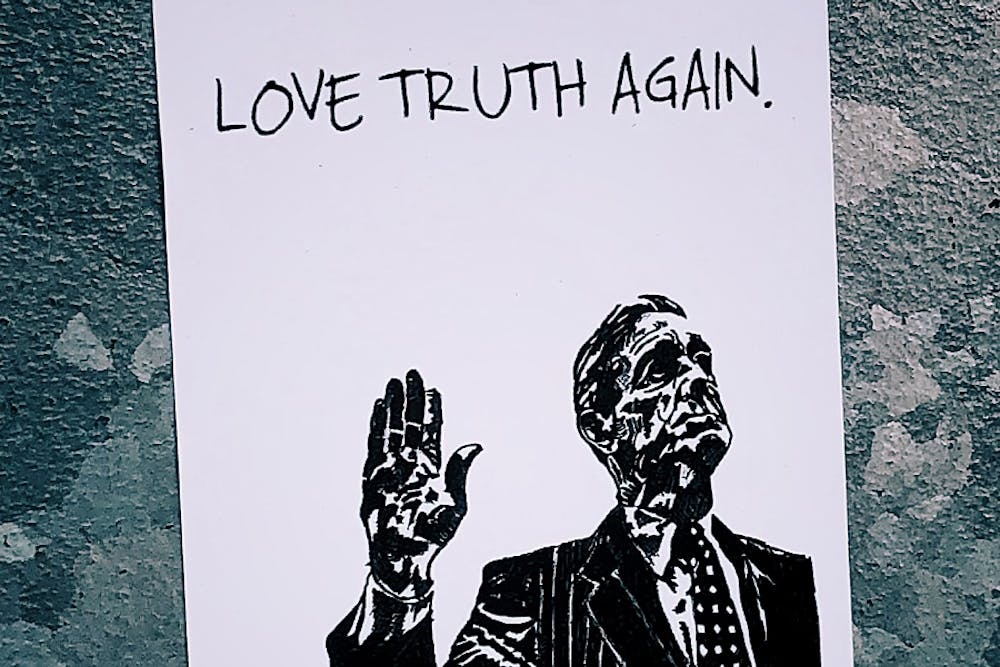Honesty is a difficult virtue to develop. It takes lots of time, effort and practice to master. Having to open your soul to someone, even for a brief and ephemeral glance, can be frightening. We don’t want to be rejected. We don’t want to be truly known for who we are — mistakes and all.
But here’s the real problem with honesty: we don’t use it enough.
When I think about honesty, my mind is called to moments from my childhood. As a little kid, I often did things my mother would disapprove of. I cut my hair. I snuck candy from the counter. Instead of helping my sister, I watched “Scooby-Doo” on a tiny box TV while my sister cleaned our basement. I sat on the steps where I could see our living room TV after being put to bed because I didn’t want to wait until the morning to watch the newest episode of “American Idol.” We’ve all been there.
When faced with the reality of what I had done, I resorted to evading the truth. “My sister cut my hair.” “There were three pieces of candy on the counter, not four.” I scrambled to look busy when I heard my mom’s footsteps on the stairs going down to the basement. I pretended to be surprised when I saw Lady Gaga playing a bubble piano during her performance of “Poker Face.” Some evasion tactics worked. Others did not. It was easier to try and cover my laziness, my impatience and my desires for a sweet treat than it was to push through difficulties. However, telling the truth was a matter of right and wrong only, and the consequences of doing wrong were clear, immediate and heavily enforced.
Growing up brought new challenges and complications with the issue of honesty. Avoiding it is no longer a matter of breaking a rule about sweets before dinner — it becomes a matter of greater severity. You can still lie to your sister about taking her skirt or tell your professor you were late to class because of a dentist appointment, but now there are a number of situations which require a truth that has moved beyond the egocentricity of our youth. They matter in the real world, they matter to real people and they are frustrating to navigate.
Sometimes we mask the truth to save the feelings of another. It can be necessary in some situations. Surely others like myself have had to spin the truth to save another’s feelings. Perhaps you’ve told someone you like their outfit to prevent them from having to try on a seventh option and spiral into insanity. Maybe you’ve lied about liking a friend’s new boyfriend or girlfriend because they seem to have found happiness and you don’t want to ruin it for them.
But in these situations, is it not our duty to use the power of honesty? To confront reality while offering support and guidance?
This is where most people fail — myself included. Complex situations involving this crucial choice often lead people to fall back on the easiest option, the most comfortable one. We don’t truly want to expose ourselves to others or reveal the reality of a painful situation. We defend ourselves from culpability and defend others from a more gruesome reality. At the same time, however, anyone with a hint of a moral compass and a sense of empathy understands what it’s like to be on the other side of a situation and one’s own obligation to uphold the truth even if it hurts.
In the end, what matters most is using honesty as a tool for good and putting that skill into practice. Social media and technology have made it so easy for us to hide behind the truth, to alter it in a way which makes us look better without having to reveal an undesirable side of ourselves. However, the truth is what enhances our authenticity, and cultivating one’s authentic self is challenging but ultimately the most worthwhile thing a person can do. Authenticity is how we form connections and how we recognize joy and fulfillment in our lives. It is what makes us human. It is what sets us free.
You can contact Anna at afalk@nd.edu.










